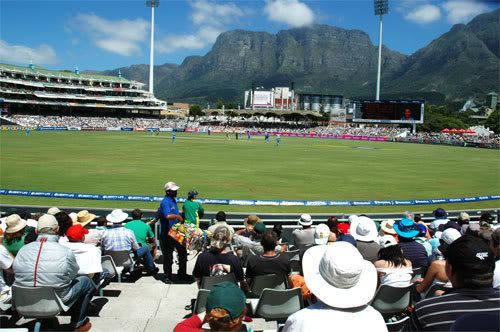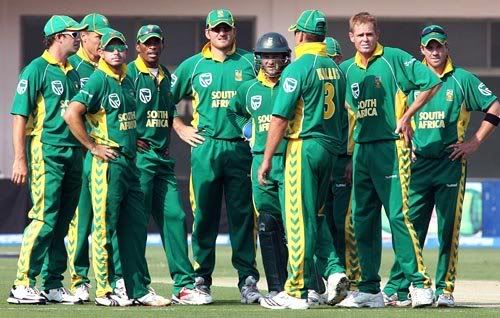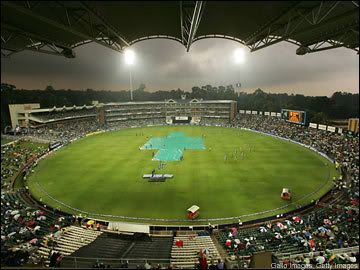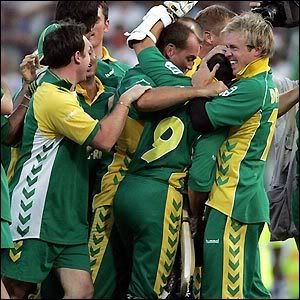

The South African cricket team, also known as The Proteas are a national cricket team representing South Africa. They are administrated by Cricket South Africa.
South Africa is a full member of the International Cricket Council with Test and One Day International status. Between February 18, 2007 and April 7, 2007, South Africa was ranked at the top of the ICC One-Day International rankings.
Cricket in South Africa was established by the British, and the first tour by a side from England took place in 1888-89. Here South Africa played its first Test match (against touring England at Port Elizabeth), becoming the third Test nation.
In 1970, the ICC voted to suspend South Africa from international cricket indefinitely because of its government's policy of apartheid, an overtly racist policy, which led them to play only against the white nations (England, Australia, New Zealand), and field only white players. This decision excluded players such as Graeme Pollock from partaking in international Test Cricket. It would also cause the emigration of future stars like Allan Lamb and Robin Smith, who both played for England, and Kepler Wessels, who initially played for Australia, before returning to South Africa.
The ICC reinstated South Africa as a Test nation in 1991 after the deconstruction of apartheid, and the team played its first sanctioned match since 1970 (and its first ever One-Day International) against India in Calcutta on 10 November 1991.
Since South Africa have been reinstated they have achieved mixed success, and hosted the ICC Cricket World Cup in 2003. However, it is widely believed the sides containing the likes of Alan Donald, Shaun Pollock, and Hansie Cronje, grossly underachieved, gaining a reputation as chokers, due to them reaching the semi-finals of the Cricket World Cup three times, but failing to progress into the finals, with Herschelle Gibbs famously dropping Australian captain Steve Waugh in 1999 in a league game. They have also had bad press for choking in vital matches in other important tournaments including the 2002 ICC Champions Trophy and the 2007 ICC World Twenty20.
With Donald retiring, Cronje banned for match-fixing and later killed in a plane crash, and Pollock nearing the end of his career, the team has once again changed shape. Due to a racial quota policy, the side now contains black players, unlike the past, it is currently captained by Graeme Smith, although following injuries to Smith and Jacques Kallis, Ashwell Prince was appointed Test captain on July 12, 2006. At the age of 29, he became the first non-white man to captain the once all-white South African cricket team.
South Africa has an unfortunate record of failing to win major tournaments. The 1992 cricket World Cup, for example, featured a rain-affected match played before the introduction of the Duckworth-Lewis method. South Africa was left in the ludicrous situation of requiring 22 runs from one ball in order to progress. At the 1999 Cricket World Cup, South Africa played against Australia in the last Super Six match as well as the knock-out semifinal. Australia defeated the Proteas in the Super Six match and recorded a thrilling tie in the semifinal, which was enough to knock the Africans out of the tournament since Australia had previously beaten them (in the match immediately beforehand). It is in the Super Six match that Steve Waugh is reputed to have told Herschelle Gibbs "Mate, you just dropped the World Cup" when the latter dropped him en route to a match-winning century, a comment which has to the disappointment of many a cricket fan been denied by Waugh himself in interviews. The image of the South Africans following the run-out of their last batsman has become an iconic sporting image, referenced by The Twelfth Man, among others.
South Africa hosted the 2003 Cricket World Cup, but failed to progress beyond the group stage due to a misunderstanding of how many runs they needed to score in a rain-affected run chase. As a result of this, Shaun Pollock resigned as captain and was replaced by young batsman Graeme Smith, although Pollock continued to play for the team. Under Smith's leadership, South Africa has achieved some success, although they have been hampered by the retirements of many star players, including fast bowler Allan Donald and one-day specialist Jonty Rhodes. As a result, they had a poor 2004, only winning against the West Indies.
South Africa became the world's No. 1 ranked side early in 2007 but then failed to deliver once again in the 2007 Cricket World Cup. They had a rollercoaster ride that included dominant wins over England, the West Indies, Ireland, Netherlands and Scotland, and a narrow win over Sri Lanka, but devastating losses to Australia, New Zealand and Bangladesh that cost them the number one ranking. Then they bowed out in the semifinals with their lowest ever score in a World Cup as Australia bowled them out for 149 and won by 7 wickets. South Africa are regarded by many as the best team never to have won the Cricket World Cup.
However, they won the inaugural ICC Champions Trophy in 1998, beating West Indies in the finals, and also won the first and most likely the only Commonwealth Games gold in cricket in the same year. They are currently ranked No.1 in the world in the One-Day International Cricket rankings and are rated in the top five for Test cricket rankings. This is due to a long streak from January to November 2005, in which they were not defeated. They gained the top position in the ODI rankings after Australia's defeat in the Chappell-Hadlee Trophy series, but lost it during the 2007 World Cup.
They also hold the record of the Largest Successful Run Chase and the Second Highest Team Total in One-Day Internationals (438-9 in 49.5 overs), in an iconic match against Australia on 12 March 2006. This game is considered by many to be the greatest One-Day International ever played.

*Acknowledgements to Wikipedia.com, Cricinfo.com, Owners of pictures
Saturday, June 21, 2008
In the International Spotlight...South Africa Cricket
Labels:
438-9,
Alan Donald,
apartheid,
Hansie Cronje,
Johannesburg,
Kepler Wessels,
Newlands,
Proteas,
South Africa
Subscribe to:
Post Comments (Atom)















No comments:
Post a Comment